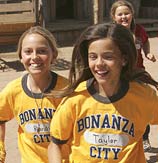 In William Golding’s “Lord of the Flies,” Piggy tells Ralph that he swims “half-bad.” In British English, this is a compliment–a positive connotation that speakers of American English have difficulty wrapping their heads around. But either meaning can be applied to CBS’s controversial “Kid Nation,” a reality show loosely based on “The Lord of The Flies” and “Survivor,” which left me at times completely uninterested and at other times, smiling broadly.
In William Golding’s “Lord of the Flies,” Piggy tells Ralph that he swims “half-bad.” In British English, this is a compliment–a positive connotation that speakers of American English have difficulty wrapping their heads around. But either meaning can be applied to CBS’s controversial “Kid Nation,” a reality show loosely based on “The Lord of The Flies” and “Survivor,” which left me at times completely uninterested and at other times, smiling broadly.
With all the hype surrounding this show, finally watching it certainly took most of the air out of the controversial build-up. Anyone who had any concerns about child abuse can rest easy knowing that most of these precocious kids are clearly child actors looking for more than local commercials. There really is no controversy here.
Here’s the set up: Forty children, ages 8 to 15, are taken to a supposed ghost town and left on their own to re-establish a community. Or, as the CBS website proclaims, “40 Kids have 40 days to build a brave new world without adults to help or hinder their efforts.”
But here’s the thing: Adults did help and hinder this “social experiment” right from the very beginning of the show–with the choice of children and format for the show. As the kids are brought to a spot just outside of the town to begin the experience (in a yellow school bus, naturally), we are introduced to them a la “Survivor.” Here’s the curmudgeonly, comic-relief kid; here are the cute twin girls; this is the rich kid; and here’s the youngest of the group, cute little Jimmy from New Hampshire.
Yes, this is a common reality television show technique–picking a stereotypical characteristic to differentiate players, but it doesn’t translate as well with children. It seems too imposed, too jaded. And it only gets worse with the introduction of the town council, a group of four pre-selected kids meant to represent different geographic regions and ages: The “genius” Indian kid; the pageant queen from the deep south; the boy scout, and the thoroughly Irish Bostonian gal who sounds just like “Survivor’s” Boston Rob. Hey, I have an idea. Let’s rename the ghost town Stereotype City instead of Bonanza!
Talk about adults hindering! These kids are already burdened with very adult characterizations.
And the town council is another adult idea. Leaders will always emerge from a group, usually through self-selection. And in fact, three of the kids–Sophia (the head cook), Michael (the peacekeeper) and Greg (the oldest)—have proven themselves more capable than all of the designated town council leaders (other than Bostonian Laurel). Certainly the producers knew that there would be dramatic tension created by the situation, and counted on it to do so. But if this is the grand experiment they claim it to be, why not just leave the kids to decide these matters on their own?
As the show progressed, the town was split into four groups which got things moving along. The winners of different challenges were assigned the highest paying jobs in town and the losers the lowest until the next challenge. And I’m happy to say the children started making mature decisions opting to take three additional outhouses over a television as one reward. Apparently, the fumes of the one outhouse for all 40 kids was more overwhelming than their need for MTV.
With more adult-directed activity, the second half of the show was hlaf-bad, if you speak British English, or wasn’t half-bad if you speak American. The kids seemed to be learning what it takes to run a community. Although, it must be said that the show seemed heavily edited and I’m still not certain how much off-camera direction these kids are getting, the producers were smart enough to cast kids who’ve raised livestock and farmed, so the group won’t starve.
And the group assumed other less tangible adult responsibilities, bolstering and caring for the emotions of those kids who felt homesick and wanted to leave the experience. They even applauded when little Jimmy decided to take his rosy cheeks and wavy hair back to his family.
In the midst of all the make-believe there was a genuine moment that really made me smile. Unbeknownst to the rest of the children, the council was watching to see who would earn the Star, which represents an award of $20,000 to go toward that child’s future. When the town council awarded the Gold Star to Sophia, easily the hardest working child, she was truly flabbergasted, as was her mother, when she was allowed to call and tell her about the prize.
While watching deserving adults win cash prizes is great, it was really heartwarming and refreshing to see a fourteen-year-old girl express such excitement and disbelief. (I’m hoping that CBS puts the money in some kind of college fund that the parents can’t touch.)
So while the show started out slowly and never lived up to the “social experiment” CBS played it up to be, I will most likely be tuning in again to see what develops. Because, of course, the children will now all want to vie for that Gold Star and are going start working and competing their butts off to get it. Now how adult is that?


